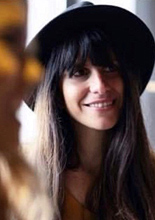DA alumna Peri-Khan Aqrawi-Whitcomb on her career since graduating from DLG 45 and MAIS 13 in 2010
 I cannot say that I completely chose my career path because often I just reacted and adapted to the opportunities and developments that life presented me. Trusting my skills and readiness to learn new things, and taking a leap of faith, getting out of my comfort zone. Mentors have always been a huge part of my academic and professional success.
I cannot say that I completely chose my career path because often I just reacted and adapted to the opportunities and developments that life presented me. Trusting my skills and readiness to learn new things, and taking a leap of faith, getting out of my comfort zone. Mentors have always been a huge part of my academic and professional success.
Growing up in a family of multi-lingual engineers, quantum physicists, doctors, UN diplomats, human rights activists, farmers, shop keepers, politicians, lawyers, administrators, essential workers, educators, who also were passionate for so many other fields, such as history, sports, arts, literature, music, you name it, it was not easy to identify which path was for me. I loved them all. At the same time, I learned very early on, due to my Kurdish family that has been uprooted many times due to wars, oppression and persecution, that the more flexible and broad skilled you are to change your career when necessary, sometimes to simply make ends meet, the better.
An admirer of old civilizations, such as the Medes, Sumerians, Egyptians, Greek and Romans, I always longed for interdisciplinarity. To know as much as possible, about as many different things as possible, and to understand synergies but also see how they can complement each other. Hence, to find sustainable solutions to complex socio-political and economic challenges. (To not be misunderstood as having lived an overly privileged childhood, though very happy one: Born in German exile, I was stateless until the age of 12.)
By the time, I had to choose my university, I contemplated applying for architecture, medicine, history, economics, engineering, diplomacy and archaeology. Not to mention my pipe dream of becoming a professional football player.
And at home my parents had two main rules: study hard and become something that adds value to society. Always reminding us children that as a citizen you have rights, but you also have civic duties. Probably, a very common reality for many children from politically exiled families, growing up in a diaspora. You must cherish the opportunity given to you to study and thrive, to one-day return to the country of your origins and contribute in rebuilding it. And if not returning to it, then at least become a good representative of your culture, by excelling, doing good, giving back, simply being a good citizen to your “host” community.
I chose to study at the University of Bonn, Volkswirtschaftslehre (economics), mostly because I was intrigued by the old name for it, as it was used to be called 'Staatswissenschaften', which literally translated to “the science of the state”. How to manage a country, with its infinite variables and changing realities internally and externally. While it was covering so many of my interests, like law, economics, politics, science, I still was missing the dynamic and practical part of it, which led me to then study business administration with a focus on international management. In 2004, post-Saddam, my father was politically appointed to be Iraq’s first Kurdish Ambassador to Austria, the UN and OPEC. Knowing I was looking for an international post-graduate programme he introduced me to the Diplomatic Academy and suggested I should sign up for the entry exams.
And in fact, it was only when I entered the Diplomatic Academy, especially its post-graduate DLG programme, that I found myself in a world of true interdisciplinarity with multilingualism being celebrated. Enjoying classes about the history of the world, by unforgettable Professor Béhar in French, being followed by international economics in English, or European law in German. Getting to know students from 45 different nationalities, their various world views, the differences, but mostly the commonalities. The true beauty of diversity, hosted between the historic atmosphere of Austrian diplomatic traditions and culture. What a beautiful Viennese melange.
Besides the wonderful lifelong friends and lessons learned at the DA, I got out with much more confidence professionally than I had when I started the DA.
All of my jobs since then required a plethora of knowledge based on diplomacy, socio-economics, politics, history, management, science, sustainable development and intercultural proficiency and sensitivity. My generalist background equipped me with a very dynamic and flexible tool kit, to combine and work in many fields of interests and circumstances. Enabling, as an independent, many private public partnerships in the field of sustainable development. Consequently, for now, I am not aiming to be professionally “constraint” in one world like that of the foreign service, academia, politics, larger organisation or civil service. Even though, by the time I was 4 years old, my family nicknamed me: the natural born diplomat. Sometimes the “annoying” diplomat, because I always take sides with the one who is factually right, rather than being influenced by internal family loyalties.
This career path paired with the state of modern communication technologies, a supportive husband, who is also a DA graduate, helped me to pursue self-employment, while being a full time mother by choice, using my patiently build global networks to work from wherever I have to be.
Proud Home office and result based work advocate rather than classical 9-5 jobs, prior to 2020.
Studying at the DA was one of my best decisions academically, professionally and personally.
[February 2021]